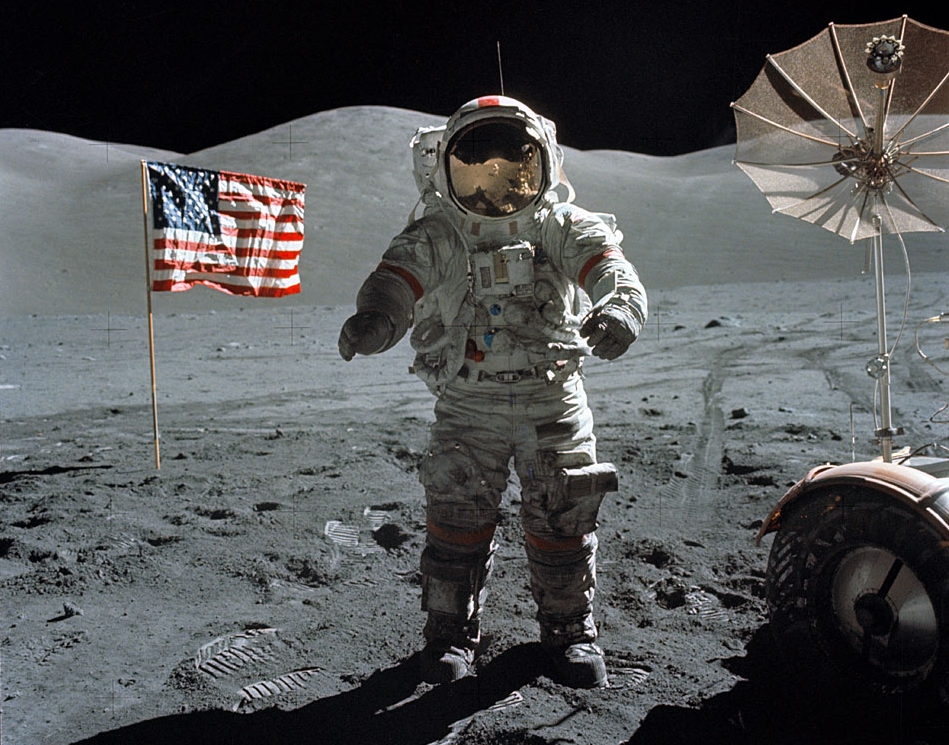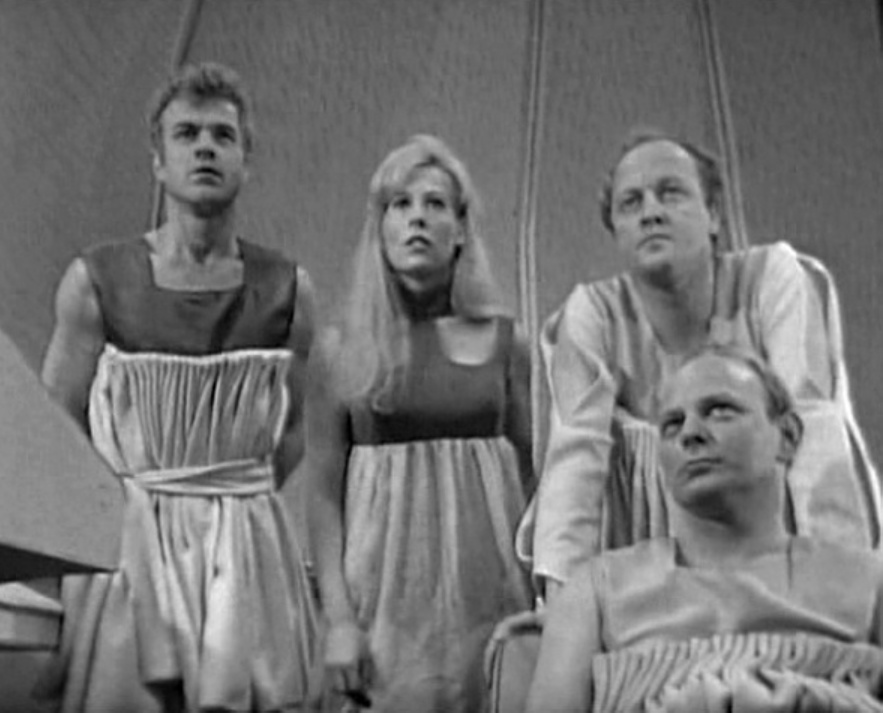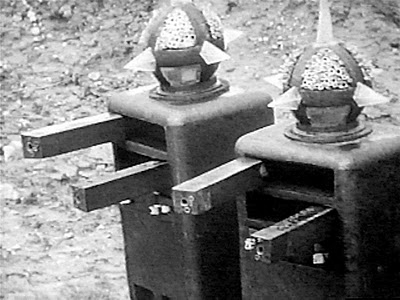STORY 045 : THE MIND ROBBER
A Mind Is a Terrible Thing to Lose...
Isn't that a beautiful sight? I think it's the most beautiful sight in the history of Doctor Who. It comes at the end of Episode One of The Mind Robber, which I believe is one of the most inventive and surreal episodes in the entire history of Doctor Who (classic and NuWho), certainly the most surreal out of the five-part story. The story itself is quite clever, inventive, and unique of the entire run of the show, and The Mind Robber is if nothing else, the most surreal Doctor Who stories to come down the pipe in a long time. I think I'm being too subtle: The Mind Robber may be the weirdest Doctor Who story ever, and certainly Episode One is the single most bizarre episode the series has ever had. In short, The Mind Robber is just flat-out weird, but it's in its inventiveness, particularly in how it managed to incorporate production problems, that oddly lift The Mind Robber to being one of the trippiest stories in the Who canon.
Having barely escaped Dulkis, the Doctor (Patrick Troughton), and his Companions Jamie (Frazer Hines) and Zoe (Wendy Padbury) are taken out of reality itself. They are being menaced by some unknown force that tempts them outside into nothingness. Episode One culminates into the unthinkable: the TARDIS is destroyed, and the passengers scattered: the Doctor whisked away while a horrified Jamie and Zoe hold on to dear life to the TARDIS console.
After that, the group is separated. The world they are in is a bizarre world, one filled with wordplay and puns. A stranger comes across the Doctor, speaking curious phrases. A group of children then harass the Doctor, at one point asking him what can one make out of a sword. The Doctor figures,"S-W-O-R-D, you can make WORDS", and the children instantly cheer and out comes a dictionary.
However, not all is going so well. As part of this mysterious world, Jamie's face has been altered to be a puzzle. The Doctor attempts to put it together but gets it wrong, coming up with a new Jamie (Hamish Wilson). The Doctor and Jamie II continue searching for Zoe, who had fallen after entering a castle. To get her out, the Doctor and Jamie are presented a riddle of sorts. They come up to the same door Zoe had walked across, but find that it's painted.
A puzzled Jamie asks how this is possible. "When is a door not a door?" he says. The Doctor quickly figures...a door is not a door when it's a-jar, and instantly we see Zoe is trapped within a jar, but is equally confused to find Jamie II rather than her Jamie. This world, they discover, is one where words are literally all around them: they are trapped within a forest of proverbs (a literal Book of Proverbs, so to speak).
Eventually, the Doctor, Zoe, and Jamies II and I (the Doctor getting another crack at putting him together and getting it right) find that this world with characters like Gulliver (Bernard Horsfall), Rapunzel (Christine Pirie) and toy soldiers is ruled over by The Master of The Land of Fiction (Emrys Jones). He is a writer from Earth who was spirited away to this world, where he has continued to create. However, he won't last forever, and believes the Doctor will make a perfect replacement. The Doctor refuses, and Jamie and Zoe binds them in a book...literally.
Using his wits, some characters of his own, including one from Zoe's youth, the comic strip character the Karkus (Christopher Robbie), the Doctor is able to overwhelm the computer, free the writer, and we end The Mind Robber with the TARDIS restored but unsure of whether everyone would be.
As I rewatched The Mind Robber, I was continuously amazed at not just how well the story holds up or even at how clever and creative it was (although I was by all that). What really impressed me was that The Mind Robber's production crew managed to incorporate every difficulty they faced and seamless place it in the story.
 |
| Gratuitous Shot... |
The first problem The Mind Robber faced was the addition of a fifth episode. The previous story was intended to have six episodes, but it was becoming so muddled and boring that a whole episode was cut. That left a gap that had to be filled in. Derrick Sherwin, the script editor, was basically forced to put an episode together at the last minute, but given the overall weird nature of The Mind Robber, the viewer never notices that Episode One was never part of the overall serial.
The inclusion of a fifth episode also forced the production crew to keep things as low-cost as possible. Again, The Mind Robber accomplishes great work: the bizarre goings-on, coupled with great acting by the three principals (and great screaming from Padbury) heightens the weirdness and surrealism of Episode One. The culmination of that episode is seeing the TARDIS broken up and the crew holding on for dear life, and everything building up to this shocking cliffhanger (one of the best in Who's history) flows brilliantly from what came before.
Once we get into Peter Ling's story proper, it becomes a witty satire of the difficulties of continuously writing stories and commentary on how literary creations, once off the page, do literally take on a life of their own. As I stated earlier, The Mind Robber has a great deal of wit with the use of puns and fictional characters and continuous bits of wit and whimsy (such as having a forest made out of letters).
However, Ling has to be given enormous credit in how he is able to tie in all the unexplained weirdness into a logical story. Almost every part of The Mind Robber works and makes sense, even when it might not have.
One of the best things to help The Mind Robber is when Frazer Hines was suddenly taken with chickenpox and forced to withdraw for a week. How could one explain Jamie's disappearance from an episode when it had been written months earlier to include him? Characters disappearing from Doctor Who was nothing new (whenever one of the cast was scheduled to take a holiday they had simply been written out of that particular episode) but in this case, Jamie HAD to be involved.
Ling and director David Maloney (who was making his Who directing debut but would go on to helm other stories, among them some that are considered the best of the series) came up with another great idea. Since this mysterious universe was one of puzzles and puns, why not have Jamie disintegrate and the Doctor forced to put him together again? This concept not only blended in brilliantly but allowed for a quick recasting of Jamie without interrupting the flow.
Hamish Wilson obviously did not look or sound like Frazer Hines, but the story works so well, and Wilson is so good, that we soon forget that while we're not watching the traditional Jamie we are watching THE Jamie. In fact, when Hines returns in Episode Three, it did make me sad to see Jamie II go. I wonder what would have happened if Wilson had been allowed to stay on, not permanently in the role of Jamie, but at least for one or two more episodes. No disrespect to Hines, but Wilson did a marvelous job filling in, and it seems almost a shame to see him go.
It is understandable that Hines would return as soon as he was well, but Wilson was brilliant in his one episode to where we were not bothered or even took great notice that the regular Jamie wasn't there. As far as the viewer was concerned, given the bizarre nature of The Mind Robber, for all intents and purposes Jamie was very much with us.
Troughton and Padbury are equally in fine form, the Doctor mixing his trademark humor with moments of calm and fear. As far as Padbury, her Zoe is bright but now we are allowed moments where she is genuinely frightened, and also she does have one of the best screams of a Who Girl, especially in this scene...
 |
| It's Iconic... |
Jones' performance of The Master (not to be confused with the Time Lord known as The Master...he comes much later) was in turn comic and menacing, but appropriately so. We saw that he wasn't evil, but as much trapped in the machine as its owner.
Side note: has anyone else gotten the sense that The Mind Robber had elements which would later appear in The Matrix (the idea of a giant machine controlling people's minds for domination)? Just a thought.
The special effects don't look dated and are actually still a bit frightening, in particular when Medusa comes to life in Episode Three. Her snakes and her coming towards Zoe and the Doctor is still remarkably effective and beautifully shot, as are the scenes in Episode One when we see all the weird happenings to Zoe and Jamie.
One might have noticed I wrote that almost every part of The Mind Robber works, but some things, if one thinks about them logically, don't make sense. For example, how could this Master of the Land possibly know about a cartoon strip written long after his time (unless the computer controlling him fed him information from all time)? Also, the actual source of the writer's control was very vague and its idea of using the writer and the Doctor's mind to conquer Earth seemed almost to be put there to give a touch of science-fiction to a story that didn't need it. The Computer seems almost shoehorned in to give a reason for the mayhem.
Now, while I found the Karkus a bit exaggerated (with the inexplicable German accent not helping matters), I never felt the story dragged and didn't notice that the episodes were growing shorter (Episode Five clocks in at 18 minutes, the shortest in Doctor Who's history...would that Closing Time have been as short or shorter, but I digress). The overall story flows so well that I never noticed issues of length, and the cliffhanger into the next story similarly flows so well that it does want us to know what happens next.
Padbury has expressed discontent over the fight sequence between her and the Karkus, and while it's not the best fight scene I've seen it hardly is as bad as Padbury believes.
Finally, a little issue I had with The Master is that the habit of his voice shifting from pleasant to harsh is far too reminiscent of The Abominable Snowmen: how Padmasambhava (the disguise for the Great Intelligence) similarly shifted from kindly to evil at the turn of a dime. I doubt it was intentional, but it is similar.
Minus those little bits, The Mind Robber is one of the wittiest Doctor Who stories, one that delved into the surreal possibilities of a show that was not bound to a particular time or place (or even reality itself). It was a great experiment that succeeded, but which alas they rarely if ever went back to. The series post-Mind Robber has pretty much stayed in science-fiction with occasional jabs at historic or history-based stories. I don't think it has gone and dealt with the fantasy elements the show lends itself too. All more the pity, as even now the possibilities that The Mind Robber explored and accomplished are not being explored. Still, fortunately for us The Mind Robber still exists in its entirety, so some great things did survive.
This would be the perfect time and place to mark the best end to a Doctor Who review...
10/10
Next Story: The Invasion





